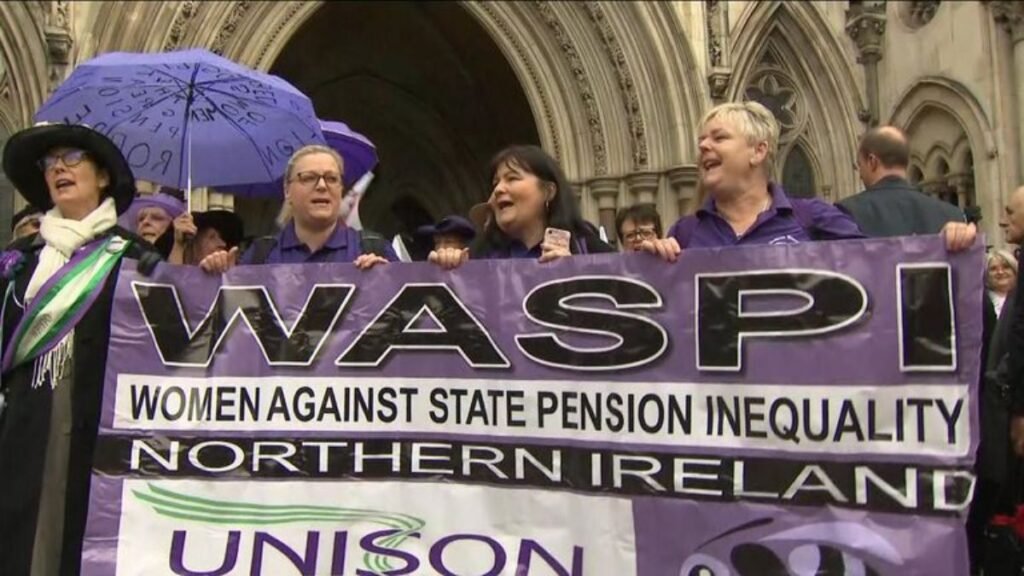DWP Announces £3,150 Payment for Affected WASPI Women: That’s a huge news for millions of women in this country who have waited for so long to get justice. The DWP Deliver has now finally declared that women connected to the WASPI movement will be compensated with £3,150.This decision is a sigh of relief for women who have suffered financial and mental troubles due to the sudden change in the state pension age. we will know in detail what is the WASPI movement, what is the background of this compensation, what are the eligibility conditions, how will the payment process be and what are its social and political implications.
What is the WASPI movement?
WASPI stands for Women Against State Pension Inequality it is a citizen campaign that started against the sudden changes made in the pension age for women born after the 1950s.
What were the main problems?
- The 1995 Pensions Act and then the 2011 amendment set out to equalise the state pension age for men and women.
- But the government did not communicate the change well enough, leaving millions of women unprepared for retirement.
- Many women had to work several years longer than planned and some had to go without income.
Why and how was the £3,150 compensation decided?
- In 2024 the Parliamentary and Health Service Ombudsman (PHSO) described the DWP’s actions as maladministration.
- The PHSO admitted that the DWP had failed to provide these women with timely, clear information about the changes, causing them financial and emotional harm.
DWP’s response:
- Following the PHSO’s report, the DWP eventually approved the payment of £3,150.
- This payment will be a lump-sum compensation.
Which women will be eligible for this compensation?
The eligibility conditions for WASPI compensation can be as follows:
- Those who were born between 6 April 1950 and 5 April 1960.
- Those who did not receive timely information about the change in pension age.
- Those who have faced financial difficulties due to this change.
- Those who have documents and evidence that can prove that they were affected.
- However, the exact eligibility criteria will be formally announced by the DWP in the coming months.
What could be the timeline for payment?

According to the DWP:
- Payments can start from early 2025.
- Priority will be given to the most affected women in the first phase.
- The application process can be conducted through online portals and letters.
WASPI campaigners’ reaction
- WASPI campaigners have described the decision as a half victory.
- The amount of £3,150 is not enough, as many women have lost thousands of pounds.
- Many women have struggled with problems such as mental stress, unemployment and poverty.
- Still, the decision is an important start.
Why is this decision historic?
- A victory for government accountability – this is the first time the government has admitted its mistake and agreed to compensate those affected.
- A milestone for women’s rights – this decision shows that women’s voices, when raised together, have the system to bow down.
- A warning for the future – this has taught that when implementing any policy, it is essential to provide timely and transparent information to citizens.
What might the application process be like?
Although the DWP has not yet released official guidelines, it is likely that the application process will be as follows:
- Registration on the official portal.
- Uploading of required documents – like date of birth proof, pension letter, economic impact documents.
- Verification by DWP.
- Direct transfer to bank account.
- Potential economic impact
- The compensation could cost the government billions of pounds.
- But it is a justice-based expenditure that is in the public interest.
- It will also ensure transparency of policies in future.
Ongoing debate in Parliament and Government
Recently, several MPs in the British Parliament demanded immediate implementation of WASPI compensation. Opposition parties such as the Labour Party, SNP and Liberal Democrats have made it a major election issue.
MPs’ reactions:
Debbie Abrahams (Labour Party): “It’s not just about compensation, it’s a question of moral responsibility.”
Margaret Fearin (SNP): “Women have borne the brunt of DWP’s failure – now the government must take action.”
Mental health and social impact
The impact of this policy change on WASPI women was not just economic, but also mental and social.
Studies reveal:
- More than 60% of women suffered from stress, depression and anxiety after this change.
- Many women had to rely on family support, which hurt their self-esteem.
Mental health experts say: This type of policy uncertainty has a huge impact, especially on senior women. Providing compensation in time is a humanitarian step.”
What the WASPI movement’s victory means for generations to come

This case makes it clear that when citizens organise and hold governments to account, change is possible.
It teaches generations to come:
- It’s important to be aware of policy changes.
- The government must provide transparent, timely information.
- If you feel injustice, it’s important to speak up – only through struggle can solutions be found.
International perspective
Other countries have taken notice of the case:
- Media in France and Germany called the decision a “new beginning for social justice in the UK”.
- In some countries, it is being seen as an example of a rights-based policy change.
Next steps – what should you do?
- If you or someone you know is involved in the WASPI movement, take the steps below:
- Register on the government website (as soon as the portal opens)
Have your documents ready:
- Birth certificate
- Pension letter
- Any evidence that shows how you were affected
- Contact your MP – he or she can take your petition to the government
- Stay in touch with the official WASPI website or local branch
Conclusion:
WASPI women, this news is not just about a payment, but about the restoration of dignity and justice. This outcome of years of struggle is a reminder to UK politics, administration and society that the voice of the people cannot be ignored. If this process is conducted fairly and transparently in the future, it can also become an inspiration for other movements and affected groups.
FAQs
Q1. Is the £3,150 payment taxable?
A. As of now, it is expected to be non-taxable, but official tax guidance will be issued by HMRC and DWP when the payment process begins.
Q2. How many women are expected to benefit from this payout?
A. It is estimated that around 3.5 million women across the UK could be eligible for compensation under the WASPI scheme.
Q3. Why did it take so long to get this payout approved?
A. The WASPI campaign has been ongoing for nearly a decade. Multiple parliamentary debates, a formal complaint to the Parliamentary and Health Service Ombudsman (PHSO), and public pressure eventually led to the DWP accepting maladministration and moving towards compensation.
Q4. Will there be a formal apology from the government?
A. There is growing demand for a public apology, but as of now, no formal apology has been issued. Campaigners continue to push for this as part of justice for the affected women.
Q5. Is £3,150 a fixed amount for everyone?
A. Not necessarily. While £3,150 has been mentioned as the average or starting compensation, there may be tiered payments depending on the level of impact experienced by the woman. Final decisions are awaited.


